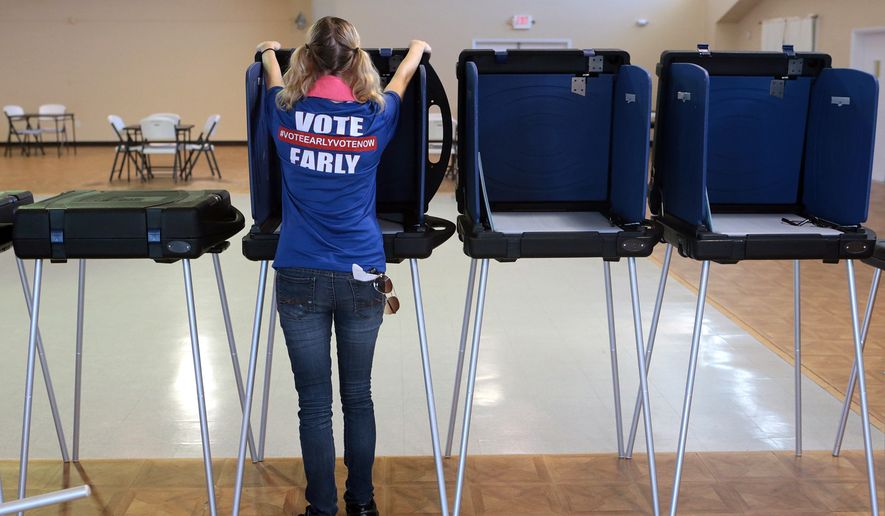After being out-hustled by Democrats in the last two presidential elections, Republicans say they’re making up ground in the voter registration and absentee-ballot battles that will be critical to winning in swing states such as Pennsylvania, North Carolina and Florida.
Republicans have invested heavily to catch up to the kinds of data-driven efforts that carried President Obama to an easier-than-expected re-election in 2012.
“We have the resources. We have the volunteers. We have the offices. So this is essentially a matter of executing at this point,” said Jeff Kaufmann, who chairs the Republican Party of Iowa — a state Mr. Obama carried twice, but where GOP nominee Donald Trump leads in recent polling.
Republicans still trail in absentee ballot requests in Iowa, but the gap is smaller than it was at this point in 2012.
In Pennsylvania, meanwhile, Democrats still greatly outnumber registered Republicans, but the GOP has closed the gap by more than 200,000 voters compared to where things stood in 2012. That was fueled in part by party-switchers — more than 97,000 people switched from Democrat to GOP this year, while only about 38,000 Republicans became Democrats.
Hillary Clinton’s camp isn’t worried. Campaign officials and state Democrats say the early indications suggest that more than enough Democrats will turn out to carry her past the finish line, based on how voters are breaking.
“I’d love to be up, but I’m not really worried about it,” said Andy McGuire, who chairs the Iowa Democratic Party. “It’s pretty darn close and I think the independents are always the key.”
Early and absentee voting are good tests of the levels of enthusiasm a campaign is generating — and they allow candidates to bank votes, letting them focus Election Day efforts on other voters not as eager to get to the polls.
“Absentee ballots for us is a major priority. It’s one of the main focuses of our volunteer efforts right now, and it’s something that from communications to political — it’s something we [are] certainly focusing on,” said Megan Sweeney, a spokeswoman for the Republican Party of Pennsylvania.
In Ohio, voters don’t register by party, but become “affiliated” after casting votes in a party primary. On that front, the Republicans have had the better of things this year.
Nearly 2 million voters voted in the March 15 Republican primary, including 115,762 — 5.9 percent — who had previously been affiliated with the Democrats. Meanwhile about 1.2 million voters cast ballots in the Democratic primary, and just 34,867 — or 2.9 percent — were previously associated with the GOP.
As of early this week, there have been an estimated 957,000 absentee ballot requests in the state — up from about 922,000 from the same point four years ago — though about a third of the requests have come from Cuyahoga and Franklin counties (Cleveland and Columbus), which were two of Mr. Obama’s strongest areas four years ago.
In North Carolina, Democrats had a voter registration advantage of about 650,000 over Republicans as of last week — though that’s down from about 800,000 in October 2012.
“Going back to 2008, we have narrowed the registration advantage for Democrats by more than 150,000,” said Dallas Woodhouse, executive director of the North Carolina Republican Party.
But the Clinton campaign touted increased registration numbers and absentee ballot requests among blacks and Hispanics — two groups that voted overwhelmingly for Mr. Obama in 2008 and 2012 — as evidence of their strength in the state so far.
A bit farther south in the perennial battleground state of Florida, there were about 4.73 million registered Democrats in August, compared to 4.46 million registered Republicans. Ahead of the 2012 election, the Democratic advantage over Republicans was wider, at about 4.78 million to 4.25 million.
But the Clinton campaign pointed to a 73 percent increase the number of Hispanic voters requesting vote by mail ballots this year compared to 2012 as evidence that Mrs. Clinton is capable of turning out enough of Mr. Obama’s coalition to win in the all-important Sunshine State.
Farther west, Democrats got a boost this week with fresh numbers that confirmed they now outnumber registered Republicans in Colorado, after Mr. Obama carried the state twice despite the GOP holding a narrow registration edge in 2008 and 2012.
In Nevada, meanwhile, Republicans have cut an overall registration deficit down to about 110,500, compared to about 117,500 at the same time four years ago, when Mr. Obama won the state by about 6 points.
• David Sherfinski can be reached at dsherfinski@washingtontimes.com.




Please read our comment policy before commenting.